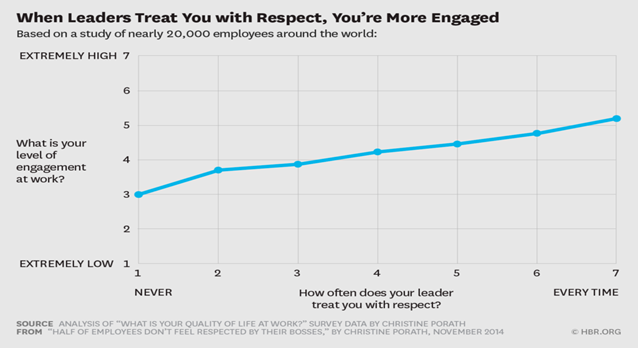
The late Paul O’Neill, who was CEO of Alcoa and Treasury Secretary of the United States, said that everyone in an organization should be able to answer “yes” to these three questions:
- Am I recognized for what I do?
- Am I treated every day with dignity and respect?
- Am I given the things I need to contribute to the organization in a way that brings meaning to my life?
In our last blog, posted on February 21, 2023, we talked about the first question – Am I recognized for what I do? – noting that most employees say they receive meaningful recognition not enough, or even not at all. This has a negative impact on employee morale, productivity, performance, and retention. But when provided with helpful guidelines, tips, tools, and templates – all part of a solid internal communications plan – leaders can become proficient in providing recognition to their employees, thereby increasing employee engagement.
Today, let’s talk about the second question: Am I treated every day with dignity and respect?
What do employees have to say about this topic? In a large survey described in a seminal 2014 Harvard Business Review article, 54% of respondents said that they don’t get respect from their leaders on a regular basis. More recent data shows that 35% of employees who left their jobs in 2021 cited feeling disrespected at work as a major reason for quitting. This is disappointing, especially when employees also said that being treated with respect leads to better health and well-being, greater feelings of trust and safety, and greater job satisfaction.
Also, the chart below demonstrates the link between employee engagement and the amount of respectful behavior demonstrated by leaders. Treating everyone we meet with dignity and respect is just the right thing to do. Most of us know that. But we can also see how it helps improve the performance of our organizations through increased employee engagement.

What leaders communicate to their employees, and how they go about it, is an important element of respectful behavior. Employees need and want to hear about what is going on in the organization. They want to know where the organization is headed. Through good communication, leaders can help employees understand how they, as individuals, are essential to contributing to the organization’s success. We call it “connecting the dots.” When we do this as leaders, we are demonstrating how much we respect every single role in the organization and, more importantly, the people who are in those roles. And we take it one respectful step further when we ask employees their opinions about how we can do things better, as leaders and as a company. By doing so, we demonstrate how much we respect our employees and their opinions.
At Red Purse Marketing, when we are helping clients design and implement internal communications strategies, we emphasize that communication is much more than just “getting the word out.” It is essential to increasing employee engagement. We provide communication guidelines and expectations – specific tools and templates – for leaders at every level in the organization. Engaging in respectful, two-way communication is a key element of the guidelines and expectations we develop for and along with our clients.
For many leaders, asking employees how the company can be doing things better doesn’t always come naturally. Harder still, and seemingly risky, is asking employees how we, as leaders, can be doing better. However, if leaders understand the power of respect in enhancing employee engagement, performance, and retention, and if they are provided tools to build their skills in engaging in respectful two-way communication, we increase the odds that the answer to the question – am I treated every day with dignity and respect? – will be a resounding “yes!” across the organization.

